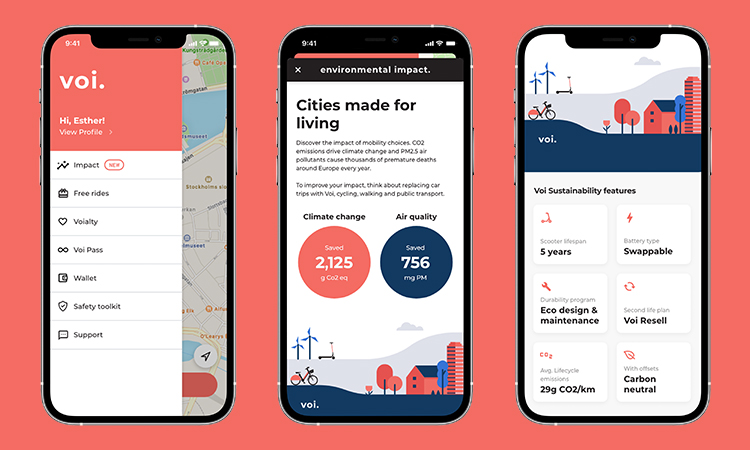 Voi introduces environmental impact app dashboard for ridersVoi’s new Impact Dashboard will display the estimated emissions that riders have avoided through opting for carbon neutral e-scooters or e-bikes in an effort to raise awareness about the environmental impact of different mobility choices.
Voi introduces environmental impact app dashboard for ridersVoi’s new Impact Dashboard will display the estimated emissions that riders have avoided through opting for carbon neutral e-scooters or e-bikes in an effort to raise awareness about the environmental impact of different mobility choices.Voi Technology – the European micro-mobility operator – has announced the launch of an environmental ‘Impact Dashboard’ in the Voi app to inform riders about the CO2 emissions and air quality impact of their journeys. The dashboard is designed to raise awareness about the environmental impact of different mobility choices and to allow riders to make more sustainable and informed transport choices.
The Impact Dashboard will display the estimated carbon dioxide (CO2) emissions that riders have avoided through opting for carbon neutral e-scooters or e-bikes for their accumulated journeys. This data will take into account the emissions produced across the full life cycle of vehicles, from production to end-of-life recycling.
According to Voi’s Life Cycle Assessment (LCA) conducted by EY, the average Voi scooter ride emits 29g CO2 equivalent per passenger-km of life cycle emissions, compared with 184 g per passenger-km emitted by a passenger car. Voi’s current life cycle emissions have been reduced drastically over the past three years, notably thanks to extending vehicle lifespan from several months to five years and scaling its net-zero operations.
In addition, the dashboard will display the rider’s average impact on air quality in grams of PM2.5 avoided. PM2.5 is the term for particulate matter with a diameter of fewer than 2.5 microns that results from partially combusted fuel. Exposure to PM2.5 caused over 400,000 deaths in Europe alone in 2018, and it is ranked as the fifth greatest risk factor for global mortality.
The environmental calculator on which the dashboard is built was verified by transport modellers at University College London’s MaaS Lab. It uses a combination of data, including: each user’s ride data; car replacement rates collected from Voi rider research; official emission factors for other transport modes; Voi’s CO2 and PM2.5 equivalents emission factors based on an LCA, which analysed the cradle-to-grave environmental impact of Voi’s service; and Voi’s portfolio of verified carbon offsetting projects.
Over time, the Impact Dashboard will develop to showcase the user’s own impact on the environment by opting for sustainable micro-mobility. This will not only allow people to further explore the carbon reduction potential of their mobility choices, but also provide them with additional information on how mobility habits impact public health.
https://www.civilengineering.ai/voi-introduces-environmental-impact-app-dashboard-for-riders-to-better-understand-journey-emissions/

Post a Comment